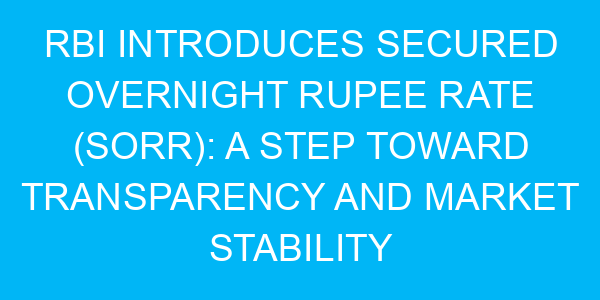The Reserve Bank of India (RBI) has unveiled the Secured Overnight Rupee Rate (SORR) as a new benchmark for the interest rate derivatives market. This significant move aligns with global best practices, promising greater transparency and reliability in India’s financial markets.
What is SORR?
The Secured Overnight Rupee Rate (SORR) is a benchmark rate based on secured money market transactions, including market repo and tri-party repo (TREPS). Developed with the support of Financial Benchmarks India Limited (FBIL), SORR aims to provide a robust, manipulation-resistant benchmark that accurately reflects market dynamics.
Key Features of SORR:
- Trade-Based Benchmark: SORR relies on real transactions rather than surveys or polling data.
- Manipulation Resistance: Designed to minimize susceptibility to distortions.
- Alignment with Global Standards: Inspired by benchmarks like the Secured Overnight Financing Rate (SOFR) in the U.S., SORR aligns India’s practices with international norms.
MIBOR vs. SORR: Understanding the Shift
What is MIBOR?
The Mumbai Inter-Bank Offer Rate (MIBOR) has been India’s primary benchmark since 1998. However, it is a polled rate, calculated based on responses from market participants, making it vulnerable to manipulation.
Why SORR is a Better Alternative:
- Data Reliability: Unlike MIBOR, which relies on polling, SORR is based on actual secured transactions, covering approximately 98% of overnight market activity.
- Global Best Practices: The methodology mirrors the SOFR framework, ensuring consistency with international standards.
- Market Accuracy: SORR reflects real-time market conditions, making it a superior benchmark for pricing and risk management.
FBIL’s Role in Implementing SORR
The Financial Benchmarks India Limited (FBIL) is tasked with developing and implementing SORR. This process includes:
- Public Feedback: Incorporating insights from stakeholders, with feedback collected until November 15, 2024.
- Recommendations by MIBOR Committee: Aligning SORR’s design with expert inputs to ensure market acceptance.
Implications of SORR for India’s Financial Markets
Enhancing Financial Instruments
SORR will serve as a reliable benchmark for interest rate derivatives, contributing to greater market stability and better risk management tools.
Expanding Access for Non-Residents
RBI also plans to allow non-resident entities gradual access to onshore Interest Rate Derivative (IRD) markets for purposes beyond hedging, fostering global investor confidence.
Aligning with Liquidity Conditions
By focusing on secured repo transactions instead of call money rates, SORR better represents overnight funding rates, aligning with the liquidity conditions of the Indian market.
Conclusion: A New Era of Transparency
The introduction of SORR by the RBI marks a pivotal shift in India’s financial benchmarking process. By adopting a robust, trade-based methodology, SORR enhances the transparency, credibility, and global alignment of Indian financial markets. This development is particularly relevant for students preparing for competitive exams in finance and economics, as it underscores key themes of market integrity and global best practices.
Key Takeaways for Exam Prep:
- SORR vs. MIBOR: Understand the methodological differences and their implications.
- Global Alignment: Compare SORR with SOFR and LIBOR for broader insights.
- Market Impact: Highlight how SORR supports transparency and stability in financial markets.
By mastering these concepts, you’ll not only grasp an important reform in Indian banking but also enhance your understanding of global financial practices.



